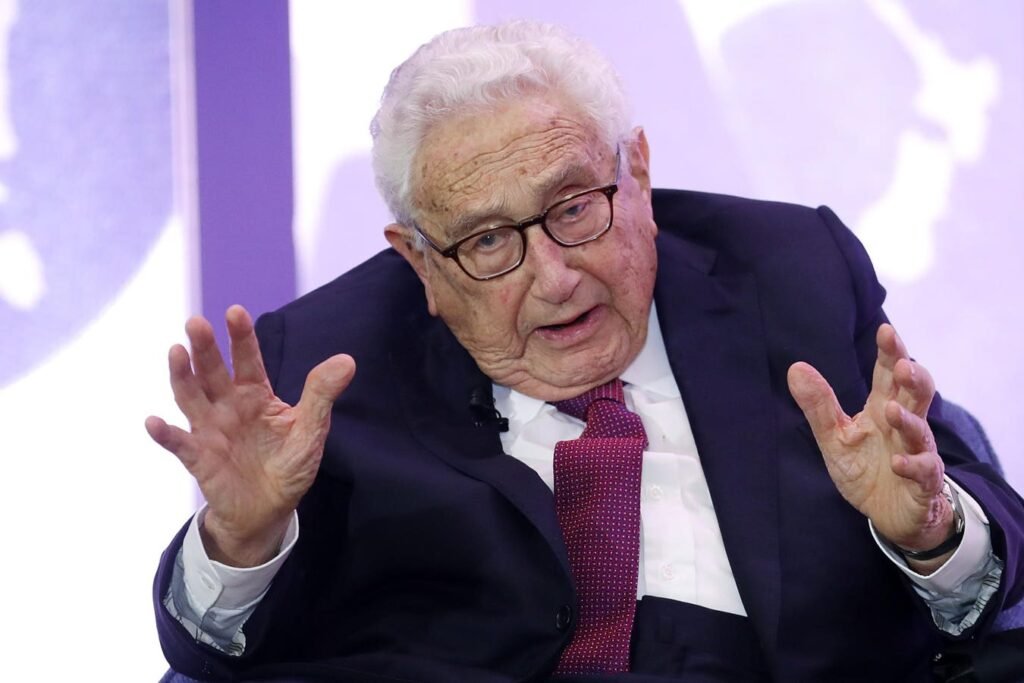Henry Kissinger will be remembered for many things, including his pragmatic approach to diplomacy. … [+]
Last year, I had the opportunity to attend a conference at Ditchley Park, a manor house in Oxfordshire, England, which has recently been identified as the setting for the Foreign Secretary’s residence in Netflix’s ‘The Diplomat’. During my stay, I was assigned to “Henry Kissinger’s room”—a space that once housed the distinguished diplomat as he discussed the intricacies of nuclear deterrence with former Secretary of State Dean Acheson in 1963. Pausing to read a framed letter he wrote Kissinger on the wall of the room, I found myself reflecting on the deep and lasting legacy left by this late statesman.
Numerous biographies have analyzed the life of Henry Kissinger, offering a wide range of perspectives. From glowing reviews to scathing reviews that carry accusations of war crimes, these narratives will no doubt fill the pages of countless opinion pieces and eulogies in the coming days and weeks. Among them, one of the most interesting I have read is “Kissinger: 1923-1968: The Idealist” by Niall Ferguson. This biography, which captures a phase of Kissinger’s life before he assumed the role for which many would know him, challenges the prevailing perception of him as the quintessential pragmatist in politics and diplomacy. Perhaps he was, at best, a kind of “pragmatic idealist.”
Regardless of one’s personal feelings toward him, there are certainly lessons to be learned from his pragmatic approach to diplomacy. One such lesson I tried to incorporate into my advocacy was his advice to engage with various stakeholders and personalities on all sides of an issue or debate. When visiting a country or state, this can extend to opposition parties and legislators. After all, opposition figures often have more time to meet than those in government. They will likely remember the goodwill they were given if they later assume positions of power. It stands to reason that people remember those who show interest in them during difficult times rather than those who seek commitment only when they are at their peak. Working with opposition parties and legislators enables more meaningful interactions and lays the groundwork for lasting relationships built on goodwill extended to individuals and their causes.
This approach finds resonance in contemporary analysis, drawing parallels with organizational psychologist Adam Grant’s concept of binary bias. According to Grant, individuals tend to perceive the world in black and white, often overlooking the fact that the world is nuanced and is best characterized by shades of gray. When applied to diplomacy and defense, the “binary bias” tendency can lead to a reluctance to engage with those on the opposite side of what we perceive as enemies, preventing cooperation on potential common ground. If taken to extremes, this aversion can block the possibility of a positive impact on common issues that both parties care about.
In my more than a decade of advocacy experience, I have sought to build relationships with both opposition and government parties, meeting active party members from across the political spectrum and not just those in power. This was part of a concerted effort to build bipartisan support for the issues I campaign on. It is particularly effective in parliamentary democracies where opposition figures often retain their parliamentary seats even after leaving government, with the possibility of returning to government. For causes supported by Global Citizen, ranging from eradicating polio to supporting smallholder farmers on the front lines of the climate crisis, this strategy has proven instrumental in maintaining continued support even through government changes, as they inevitably occur. At the very least, opposition figures can play a critical role in holding governments to account for the promises they have made.
I have seen the impact of this approach first hand. Entire budgets for global health vaccination programs, for example, were protected in Australia after the change of government in the 2013 Federal Election because of the time we spent cultivating bipartisan support on both sides of the aisle.
Of course, like all advocacy approaches, this degree of “realistic idealism” can be used for noble and questionable purposes. Kissinger’s critics describe him as unethical during his tenure with horrific consequences. Conversely, others argue that his foresight on geopolitical issues, such as China and other world powers, played a key role in reshaping the world and promoting peace. Given the controversy surrounding his legacy, it is perhaps not surprising that an accolade often omitted from the leading biography of Kissinger was his receipt of the Nobel Peace Prize. This award may have been overshadowed by the controversy surrounding his alleged involvement in the horrors of the Vietnam War and the related bombings of Cambodia during the same period.
And yet, complicating matters, this pragmatic approach—working with a variety of stakeholders, including perceived enemies—led Kissinger to his historic meeting with then-Chinese Premier Zhou Enlai in the early 1970s. This interaction was seen as a of Kissinger’s most significant and long-term achievements – paving the way for China’s re-entry into the international order in the 1970s. Even until his death, Kissinger maintained a relatively less aggressive stance on US-China relations compared to latest war rhetoric on Washington Hill, believing that such adversarial relations would be bad for both the superpowers and the world.
Kissinger’s diplomatic toolbox, whether we remember him as a controversial war criminal-like figure or as the 20th-century equivalent of Bismarck, dedicated to keeping the peace through balance-of-power diplomacy. Qualities associated with pragmatic idealism, such as engaging with political opposition figures and promoting rapprochement with our perceived enemies, are of increased importance in our modern world. Today, marked by the urgent need for global cooperation and solidarity, both at home and abroad, these principles are more critical than ever to meet the formidable challenges of our time and usher in peace and prosperity for the generations to come. generations.
